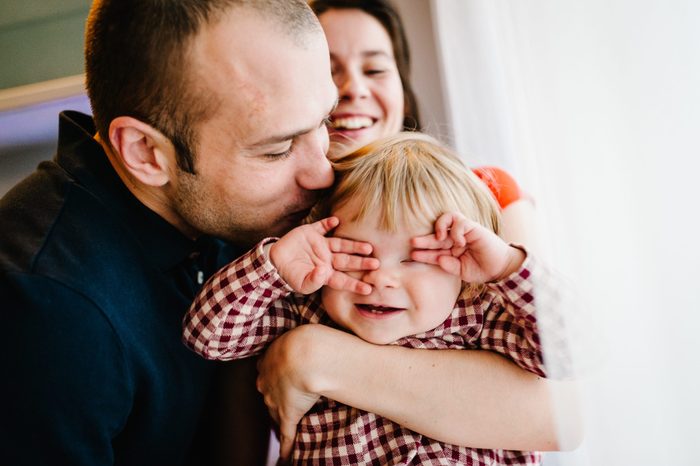
Middle children are natural negotiators and mediators
Every child in the birth order has their gambits: The elder child has natural clout among parents and siblings, the younger has whining and sympathy on her side, and the middle must learn to negotiate between the two—by any means necessary. “Middle-borns are the most willing to wheel and deal,” notes Frank Sulloway, PhD. As a result of literally being in the middle of most sibling disputes, many middle children learn to become patient, diplomatic, good listeners, and able to see arguments from multiple sides. Their voice is rarely the loudest—but often the most persuasive.

Middle children are good under pressure
Some research shows that firstborn children have a higher risk of depression than middle or last born kids. Unlike firstborn kids, middles are usually under less pressure from their parents to succeed. Plus, they aren’t too hard on themselves. Another study found that middles are less likely to develop other emotional disorders or be diagnosed with ADHD. Not cracking under pressure is one of the best middle child traits.

Middle children are easygoing
Middles know all about compromise. Having this too under their belt means they can go with the flow better than first or lastborn children. This could also be because parenting styles relax by the second child. Some parents might not even realize that they act differently with their children as they gain parenting knowledge over time.

Middle children are innovative
Middles are more likely to affect change more than any other birth order, according to Katrin Schumann, co-author of The Secret Power of Middle Children. This innovation is thanks to their openness and willingness to try new things. One study even found that middles are 85 percent more open to new ideas compared to 50 percent of firstborns. That’s why these middle kids, like these 14 famous people you didn’t know are middle children, have some special talents.

Middle children are team players
Unlike older siblings, middle children are born into a world of sharing, proving that middle child syndrome doesn’t exist. From day one, middles must share their space, their time, their parents’ affection and, perhaps most importantly, their toys with at least one other child. Because of this, middles learn strong sharing and collaboration skills with little provocation and, as a study in the Journal of Genetic Psychology notes, middle children tend to do better in group situations than older and younger siblings. Curious about firstborn and lastborn traits, too? Here’s what your birth order reveals.

Middle children make the best friends
Because middle children often do receive less attention from their immediate family, they are more likely to seek strong relationships elsewhere. “Middle children, probably because they feel overlooked, will have a tendency to create stronger friendships and long-term relationships,” says Lisa Lewis, MD. Relying more on relationships outside of their parents for emotional support is also a factor, adds Nedra Glover Tawwab, Licensed Clinical Social Worker and Owner of Kaleidoscope Counseling in Charlotte, North Carolina adds. Friends of middles will thus benefit from a long, loyal relationship, founded on genuine compassion rather than convenience.

Middle children have small egos
Because of their lack of attention at home, some middles have been shown to develop a lower sense of self-esteem than their siblings. While some see this as a weakness and a symptom of middle child syndrome, there are powerful strengths on the flip-side: For one, middles are shown to deal with rejection much better than their siblings and have smaller egos. All this taken together leads to a powerful conclusion…

Middle children make strong leaders
Middle children are uniquely privileged to learn from their older siblings while simultaneously serving as role models to their younger siblings. This dual nature of student and teacher creates strong empathy, negotiating skills, and flexibility—all powerful tools for leaders. You might not be surprised that more than half (52 percent) of U.S. presidents have been middle children, including Thomas Jefferson, Abraham Lincoln, Teddy Roosevelt, and John F. Kennedy.

Middle children make great lovers
According to Schumann, friendship and leadership are only two of many ‘ships that middles are born to captain; relationships are another. “An Israeli marital happiness survey shows that middles are the happiest and most satisfied in relationships,” Schumann tells Psychology Today. This may be because middle children naturally favor compromise over conflict, and are often in tune with the needs of others. Much like their friendships, middle children’s relationships tend to be long-lasting—and loyal. Still believe that there is such a thing as middle child syndrome? Middles still agree that these are the 16 things only middle children understand.

Middle children thrive among their own kind
Full disclosure, now that we’ve come this far together: I am a middle child, my best friend is a middle child, and my partner is a middle child. Science says that’s totally normal. Per a 2009 study from the Journal of Individual Psychology, middle children tend to grow romantic relationships with other middle children. This could be attributed to the high-empathy, low-ego combo many middles exhibit—but I like to think it’s just because middle children are awesome people. Now, could I share any of my toys with you?

Birth order doesn’t automatically determine your personality
Many family variables impact your personality more than your birth order including the gender of other siblings, the financial situation of the family, divorce, and having a blended family, according to Arlene B. Englander, LCSW, MBA, a Columbia University-trained licensed psychotherapist. “In short, birth order may provide us with informative data in some situations, but we need to look at the whole picture and avoid stereotypes when seeking answers about how persons became who they are today,” Englander says. In the same breath, some people might not identify with their birth order at all because of these factors. That’s why doctors created a “psychological birth order” inventory that measures how someone feels and identifies with a place in their family, regardless of the order they were born. If you are a middle child, you should still watch out for these 12 things.